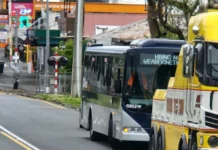The Tongan government wanted to clarify what it described as misunderstanding by critics who opposed the government’s visa policy change to help increase the number of Chinese tourists coming to Tonga.
China and Tonga have reviewed their visa policies granting their tourists a 30-day entry visa upon arrival in both countries.
The move was to fast-track the kingdom’s tourism, trade and investment developments.
But some critics took it wrongly describing it on social media as an opportunity for thousands of Chinese to flock the kingdom “without visa”.
Tonga’s Immigration CEO Kulufeinga ‘Anisi Bloomfield said this was wrong and that all Chinese tourists coming to Tonga were subjected to a visa that must be granted upon their arrival at Fu’amotu International Airport.
The “visa is stamped on arrival”, he told Kaniva News.
When their visas expired they have to leave Tonga or they would be treated as overstayers.
The issue was also raised in Parliament this week with Lord Nuku saying he was concerned at the government policy which allowed tourists to come to Tonga without visa (“ta’e visa”).
However the Prime Minister corrected the noble and said the government has no policy that allowed tourists to come to Tonga “without visa”.
The Health Minister joined the discussion and said it appeared there was a problem with the Tongan translation of the phrases “visa on arrival” or “visa waiver”. They both translated into Tongan as “ta’e visa” which literally means in English “without visa”.
The Whole House Committee chair agreed the translation was wrong.
The Prime Minister said all tourists must be checked out at the airport before issuing their visa.
They have to convince the immigration staff that they were genuine tourists with no intention to work or stay after their visas expired.
Other Pacific countries
Tonga’s Minister of Health Saia Piukala told us he was surprised to find out Tonga was too late in moving to offer this tourism opportunity to big countries of the world.
He said they met with Pacific Foreign Affair Ministers in New York last month and the Russian minister thanked some of these Pacific nations including Fiji, Samoa and Vanuatu for allowing the Russians to come to their countries on “visa on arrival”.
“Fiji and Samoa always move ahead of us especially when it comes to deal with tourism on international level”, Hon Piukala said.
The European Union has allowed Tonga to enter their member countries on “visa on arrival”, the minister said.
Before that Tongans overseas had to go to London to apply for a visa so that they could enter these countries.
He said the gist of the idea was that for the big countries like China to reduce the time and costs their tourist people incurred after seeking for visas so they can travel to Tonga.
The Minister said the Chinese have to travel to Beijing to apply for a visa that only cost them US$65 to come to Tonga.
“You see they would spend more money on their travel to Beijing just to get the US$65 dollar visa. It does not make sense”, Hon Piukala said.
China is a big country and such travelling could be compared to travelling from Tonga to New Zealand and one could imagine the time and financial costs involved, he said.
China’s growing interest in Tonga Tourism
The following is a statement released by Tonga Tourism to Kaniva and other media:
A Memorandum of Understanding (MOU) was signed in Tonga in July 2015 by the Chairman of the China National Tourism Administration, His Excellency, Mr. Li Jinzao and the former Minister of Infrastructure and Tourism, to implement a Roadmap for Tourism Development in the Kingdom.
The MOU has opened up an important milestone and chapter in Tonga’s history and tourism, and has strengthened and expedited intercultural dialogue and exchanges between the two countries.
Chinese Travel Agents and Tour Operators were brought into Tonga immediately after the signing of the MOU to inspect facilities and tourist related services in preparation for Chinese Tourist arrivals.
Both Governments have also changed their visa policy to grant Chinese Tourists a 30-day entry visa upon arrival in the Kingdom and vice-versa. It is an attempt to fast-track the Kingdom’s Tourism, Trade and Investment developments.
Tonga has already participated in two important tourism meetings hosted by China in May and September this year. The International Island Tourism Conference held in September concluded with Tonga signing a Friendship and Collaboration Agreement with the Mayor of Zhoushan City, Wen Nuan.Tonga was represented at the conference by the Deputy CEO for Tourism, Mr. Sione Finau Moala-Mafi, the First Secretary at the Tonga Embassy in Beijing, Mr. Tupou Vaipulu, Lady ‘Eseta Fusitua and Mrs. Pulotu Palu of Palu Aviation. Tonga-China’s Commissioner for Trade and Tourism, Mr. Tony Chen and his staff, including Ms. Satua Tuakoi, Tevita Pasi were also in attendance. The conference gave Tonga another opportunity to promote and strengthen its relationship with the Chinese tourist market.
Alongside the international Conference, a Tourism Exhibition was held and Tonga was able to showcase what it can offer, especially its unique cultural heritage and marina activities.
Chinese investors had also expressed an interest in developing Five star Resorts and Hotels and alternative air travel routes. They are looking into the possibility of direct flights from Hong Kong, Beijing, Shanghai and Zhoushan to Tonga.
This will certainly reduce travel hours from 15 to 9 hours and avoid the hassle of obtaining transit or stopover visas in other countries including New Zealand. Tonga’s revised visa policy for Chinese tourists has been regarded as a significant bonus making travel to Tonga for Chinese nationals a lot easier and convenient. It is possible that Tonga could become a Hub for Chinese tourists to the Pacific Region.
The Tonga Ministry of Tourism is optimistic that the continuing exchanges between the Kingdom of Tonga and the People’s Republic of China will continue to be strengthened to boost economic development and help Tongans who depend heavily on tourism for their livelihood.







